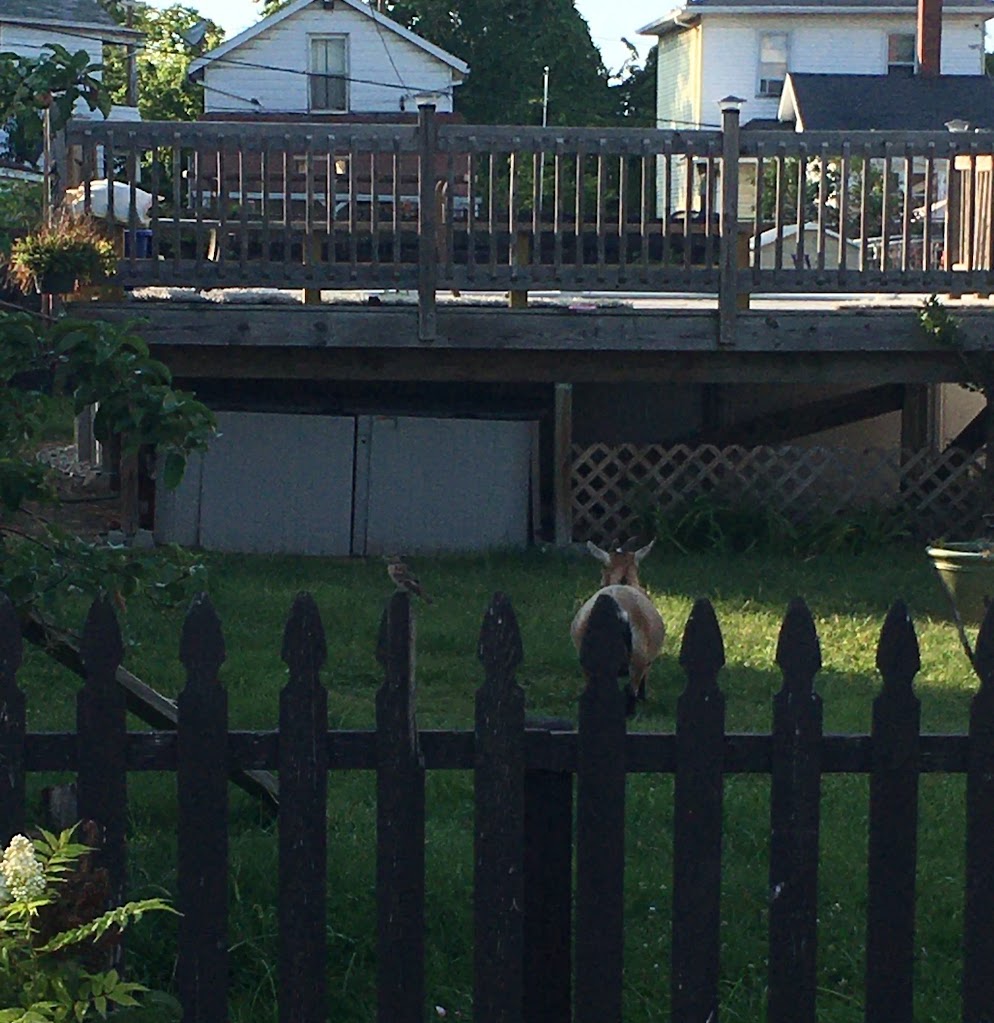Part One: Toledo
The minivan, blue and cloudless as the sky, rolled slow through the streets of East Toledo. Its tattered seats were damp with the sweat of my back, the fabric refusing to dry in humid air. Its open windows, every so often, sent notes of sulfur and cement up my nose, riding through on the respite of a faint breeze. On the street below, the occasional loose cobblestone made for uneven terrain—each lurch of the car gnawed at the curd of motion sickness in my stomach, born nine hours and three state lines ago.
In the driver’s seat, Layla peered ahead through the heat in a tired search for the night’s site of temporary lodging. A bead of sweat slipped under the rim of her glasses, leaving shiny footprints to highlight the curvature of her face. Her curls had unraveled themselves over the course of the day, and with every turn of the wheel they grew further apart, resisting containment. Pausing at a stop sign, she ventured her elbow out to lean against the window, but the hot metal door prompted a quick recoil. A few more blocks to go before our first rest.
The streets were quiet and empty of people. Up on the right, in front of each vacant house, rose a tall wire fence decorated with a dozen ‘beware dog’ signs, one every few feet, shouting through their sharp corners and neon hue. The signs were outnumbered only by the dogs themselves, which populated the yards behind the wire with consistent abundance. Groups of them gathered beside each porch, following the slow creak of the van with low growls and curious eyes, passing us off to the stares of the next pack as we left their yard behind. Some were large and hunched over, with heads that skated above the ground, held still by thick, rippling necks that curved upwards to stab the sky before reassuming connection with their spines. Others were small, with stumpy legs that grew blurry as they chased one another, carving a maze through the longer, slower limbs that rose like tree trunks around them. Many were old and withered and sick, with fur that clumped at the sides of their faces and buzzed with other creatures of the yard. One, Layla pointed out, was not a dog at all but a goat, hooved and horned and staring dejectedly into space. We silently wondered where in the world we were.
My present meander through Toledo, destined for the west coast, had been a fairly spontaneous undertaking. Though, I suppose, equally unexpected was the onset of the pandemic, not to mention the sudden eviction from campus three quarters into freshman year and the ensuing six months I spent confined to my 80 square foot New York City bedroom. The year had already been an uphill battle, tossed back and forth between New York and Providence like the plaything of two depraved orcas. College life, in all its excitement, quickly became a fever dream upon my return to the city, where the fullness of the life I’d left behind struck me hard atop the head. When my stay in New York suddenly stretched endlessly into the future, and the world outside went vacant, I was left to stew in the mildew of this old life, the milky decades of memory that stained the walls and floors and city streets. Space itself became a yellowing palimpsest, writhing with the specters of the past, some lovely, fond, and warm, others indelibly painful, but all of them dead. To bring the walls alive was to feel it all, all at once, so I did—and my present began to rot alongside my past.
So, Layla and I decided to leave. Rather than return to school and experience a loose translation of the life we wanted, we faced the death of our expectations head on and elected to drive west to spend a few months working and living on an orchard in California. We found the place online, called the owner—who seemed nice enough, for a stranger—and hopped in the minivan to begin the sixty hour drive that would, eventually, herald our chosen life among the trees.
But before the trees came Toledo, Ohio. And before our rest came that endless row of houses, houses that the blue minivan rolled past careful and slow, houses guarded by dogs.
* * *
The houses stood short and sprawlingly wide, hidden behind the high fence and maximalist ornamentation of their front yards. Pink slats fell haphazardly off their sides, as if knocked down by the heavy weight of the sun. Windchimes spun and sprinkled themselves into the breeze. Thick weeds corroded the corners of stacked pots; wooden welcome boards and cheap statues overcrowded nearly every lawn.
One house in particular had a yard piled high with life size plaster replicas of the dogs that stood cautiously behind them. The copies seemed frozen in time, as though some moment of the past, in its intensity, caught hold of the animals and refused to let them pass wholly into their future. Yet there they stood beside the plaster, alive and in steady movement, treading seamlessly across the debris. They followed our procession magnetically, without any interruption in their line of sight—not even for a moment.
The car rolled to a halt at a pleasant little house, just past a road that sectioned off our street from the caravan of pack animals on the other side. Digging the key out from under the front mat, we unlocked the door and step into the cool air inside. Immediately, I let out a long sigh of relief, and Layla looked at me, grinned sheepishly, and delivered a long and contented yeahhh of agreement. But it wasn’t just the air for me—it was these walls, big and beautifully unfamiliar. These walls to whom I was a stranger. Walls with memories to which I did not subscribe.

The Toledo neighborhood goat.
As we looked around, we realized the place was far too big for just two people, so we came to occupy the back corner of the house, dark green and dimly lit by the candle lights that protruded out from the wall. A few minutes after collapsing in the bedrooms, we received an alert that the house a few doors down the street had been the site of a murder merely three days earlier. It was hard to imagine that the lavender shutters of the home, in their softness and levity, could bear witness to such a crime. Layla wondered aloud what the dogs must have thought was going on, whether in them the noise might have sparked fear or excitement. I thought intently of the walls. After a silent moment, we descended to double lock the front door before retiring upstairs.
For all the strangeness of the day, Toledo afforded me a heavy, uninterrupted night of sleep. As we rose with the sun the next morning and continued our journey west, the shouts of dogs and occasional bleat echoed through the empty streets. Despite the noise, I neglect to turn around and look.

Zachary Federman is a student at Brown University studying literary translation and Middle East Studies. Zachary is fond of art, detests logical positivism, and is excited for the future.
For over 20 years, the Campus Clipper has been offering awesome student discounts in NYC, from the East Side to Greenwich Village. Along with inspiration, the company offers students a special coupon booklet and the Official Student Guide, which encourages them to discover new places in the city and save money on food, clothing, and services. At the Campus Clipper, not only do we help our interns learn new skills, make money, and create wonderful e-books, we give them a platform to teach others. Check our website for more student savings and watch our YouTube video showing off some of New York City’s finest students during the Welcome Week of 2015.

